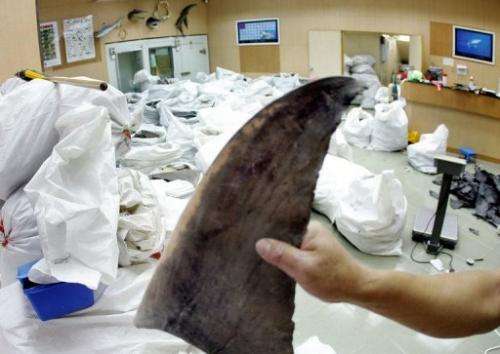US backs adding teeth to global shark protection

The United States said Friday it would support proposals to curb the trade of five shark species and manta rays, whose numbers are declining because of demand for fins and gills.
"For several decades, we have been increasingly concerned about the over harvest of sharks and manta rays," US Fish and Wildlife Service Director Dan Ashe said in a meeting at the United Nations, according to a statement.
Ashe will lead a delegation to Bangkok in March to attend a conference of parties to the Convention on International Trade in Endangered Species of Wild Fauna and Flora (CITES), which is set to consider the new measures.
"We believe that CITES is a valuable tool to address the threats posed by unsustainable global trade in shark fins and other marine species and their parts and products."
Shark fins are in high demand, particularly in Asia, where they are sought after for their culinary and medicinal value. Manta Rays are harvested for their gill plates, used in homeopathic remedies.

The new restrictions would apply to manta rays and five shark species—the porbeagle, scalloped hammerhead, great hammerhead, smooth hammerhead, and oceanic whitetip—and must be approved by two-thirds of member states.
The listings would increase protection but still allow "legal and sustainable trade" in the species.
"Sharks and manta rays are extremely important to the ocean ecosystems," said Sam Rauch, of the US National Oceanic and Atmospheric Administration.
"The global protection that CITES offers to these incredible species will complement shark measures that have been adopted regionally, and will help ensure their survival."
The convention has been signed by 177 nations, and currently offers protection to some 34,000 species worldwide.
(c) 2013 AFP



















